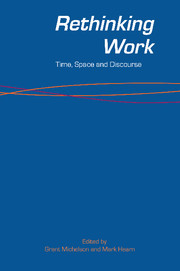Book contents
- Frontmatter
- Contents
- Tables and Figure
- Contributors
- Editorial Statement
- Abbreviations
- 1 Going to a New Place
- PART I TIME
- PART II SPACE
- PART III DISCOURSE
- 11 The National Narrative of Work
- 12 Shareholder Value and Corporate Social Responsibility in Work Organisations
- 13 Rethinking HRM
- 14 Identifying the Subject
- 15 Constructing Older Workers
- COMMENTARY
- Index
12 - Shareholder Value and Corporate Social Responsibility in Work Organisations
Published online by Cambridge University Press: 05 June 2012
- Frontmatter
- Contents
- Tables and Figure
- Contributors
- Editorial Statement
- Abbreviations
- 1 Going to a New Place
- PART I TIME
- PART II SPACE
- PART III DISCOURSE
- 11 The National Narrative of Work
- 12 Shareholder Value and Corporate Social Responsibility in Work Organisations
- 13 Rethinking HRM
- 14 Identifying the Subject
- 15 Constructing Older Workers
- COMMENTARY
- Index
Summary
The last couple of decades have seen the interplay of two strong and potentially competing meta-discourses about organisations and the factors that ought to shape their behaviour. The first and more established discourse – associated with the rational, economic notion of ‘shareholder value’ – sees the interests of the shareholder as paramount and encourages managers to privilege only those strategies and decisions that directly benefit shareholders in the short term. At the same time, a second discourse – ‘corporate social responsibility’ or CSR – speaks of a range of legitimate claims on the organisation and suggests that social, ethical and moral considerations ought to play a more significant role in corporate strategic planning and decision-making.
The Economist, one of the world's leading business magazines, recently published a major and critical review of corporate social responsibility, noting with alarm that ‘if businessmen had a clearer understanding of the CSR mindset and its defects, they would be better at their jobs and everybody else would be more prosperous. Simply put, advocates of CSR work from the [false] premise that unadorned capitalism fails to serve the public interest’ (Anon. 2005: 11).
While influential publications such as The Economist consider shareholder value and CSR to be conflicting and incompatible views of the organisation, recent literature has downplayed the suggested mutual exclusivity between the two discourses. For instance, there has been a growing tendency to present CSR as helping to serve ‘instrumental’ organisational purposes (for example Jones 1995; Garriga & Mele 2004).
- Type
- Chapter
- Information
- Rethinking WorkTime, Space and Discourse, pp. 239 - 262Publisher: Cambridge University PressPrint publication year: 2006
- 2
- Cited by

